British Values
The DfE has recently reinforced the need “to create and enforce a clear and rigorous expectation on all schools to promote the fundamental British values of democracy, the rule of law, individual liberty and mutual respect and tolerance of those with different faiths and beliefs.”
At Bottesford Primary School, these fundamental British values are promoted and embedded into all parts of school life.
Our RESPECT Values and our British Values and Citizenship policy reflects these values, ensuring that all members of our school understand the importance of these values and how they are essential to enable us to operate as a community.
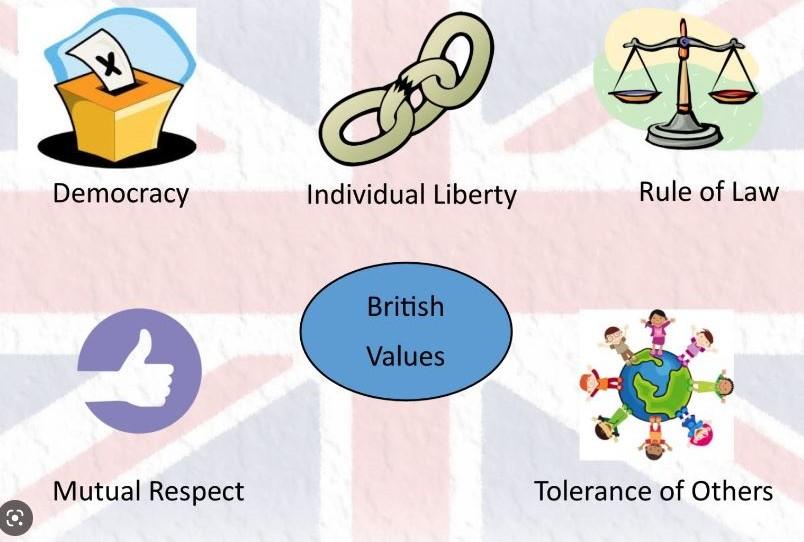
What are British Values in Education & where did they come from?
For schools in the UK, British Values refers to a set of values that the government believes are important for children to learn. They include respect for the rule of law, individual liberty, democracy, and mutual respect for and tolerance of different faiths and beliefs. The promotion of these values in schools is part of the government's efforts to create a more cohesive and integrated society, as well as a way to protect children from extremist ideologies.
The promotion of British Values began after the terrorist attacks in London in 2005. After the attacks, the government introduced a number of policies and initiatives aimed at promoting British values in schools, including the PREVENT program, designed to prevent radicalization and extremism.
Intentions:
- To enable pupils to develop their self-knowledge, self-esteem and self-confidence;
- To enable pupils to distinguish right from wrong and to respect the civil and criminal law of Britain;
- To encourage pupils to accept responsibility for their behaviour, show initiative, and to understand how they can contribute positively to the lives of those living and working in the locality of the school and to society more widely;
- To enable pupils to acquire a broad general knowledge of and respect for public institutions and services in Britain;
- To further tolerance and harmony between different cultural traditions by enabling pupils to acquire an appreciation of and respect for their own and other cultures;
- To encourage respect for other people;
- To encourage respect for democracy and support for participation in the democratic processes, including respect for the basis on which the law is made and applied in Britain.
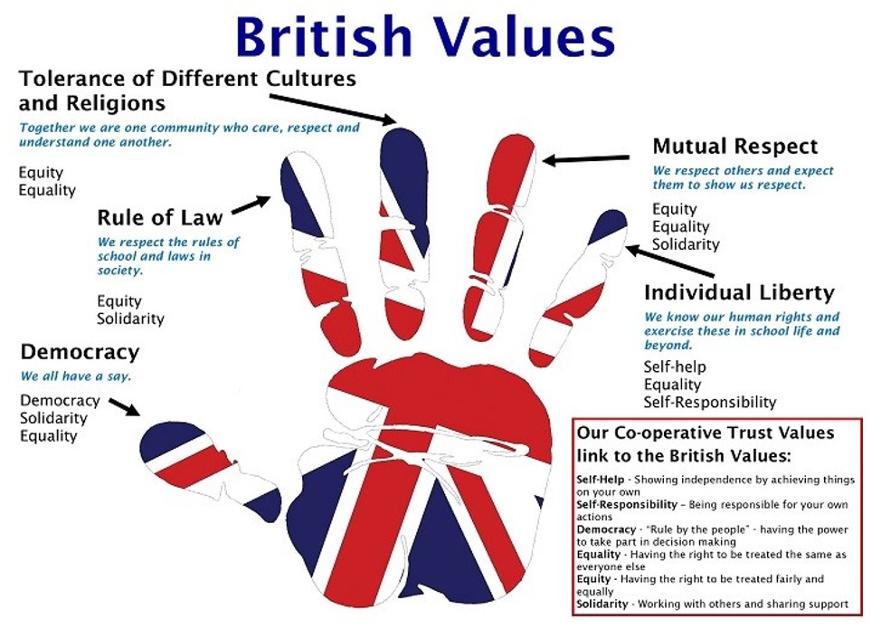
What are the 5 British Values in Education?
1. Respect for the Rule of Law
Respect for the rule of law means that everyone in society is treated equally and fairly, and that everyone follows the same rules and laws. This value promotes a sense of order and stability in society, and helps to prevent crime and other harmful behaviors. The UK justice system is a large part of this, including laws, police officers and courts.
2. Individual Liberty
Individual liberty allows people to pursue their own goals and interests, providing they do not harm others. This British value is based on the idea that people should be free to make their own decisions and choices within the bounds of the law, of course.
3. Democracy
Democracy is the foundation of the UK's political system. This value is based on the idea that everyone should have an equal say in how their country is run, and that the government should be accountable to the people. All things voting, elections and referendums come in to play here.
4. Mutual Respect and Tolerance of Different Faiths and Beliefs
There is some confusion around the fourth British Value, which is often split into two: (1) Mutual respect and (2) tolerance of different faiths and beliefs. Whether you view these as one whole, or as two individual values, they both promote understanding and acceptance of people from different backgrounds and with different beliefs, and help to create a more inclusive and diverse society.
Why should schools teach British Values?
Schools in the UK have a responsibility to promote British Values, as outlined in the Department for Education's British Values guidance (last updated in 2014). This means that teaching and learning about British values should be an integral part of the school experience, and should be reflected in all aspects of school life.
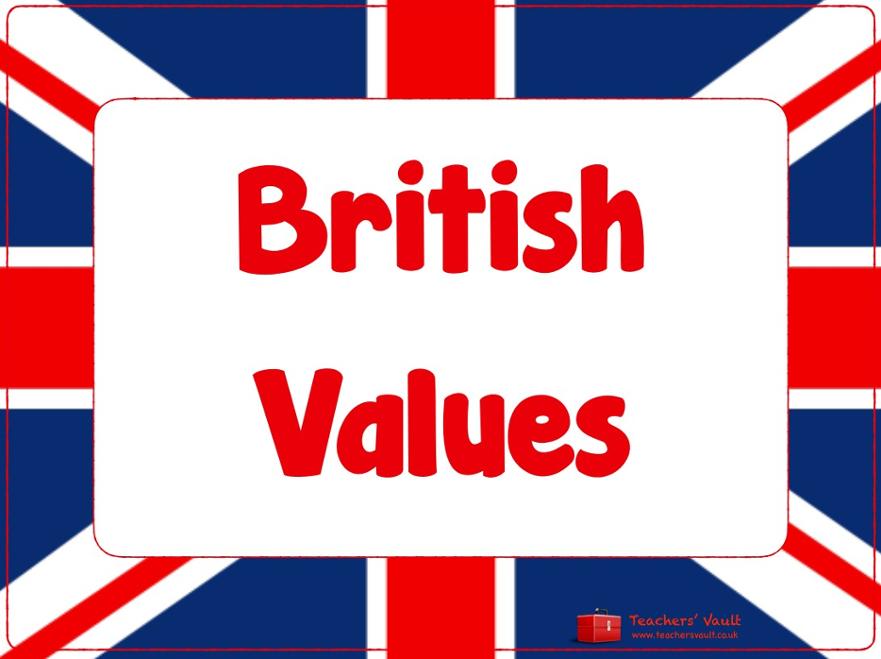
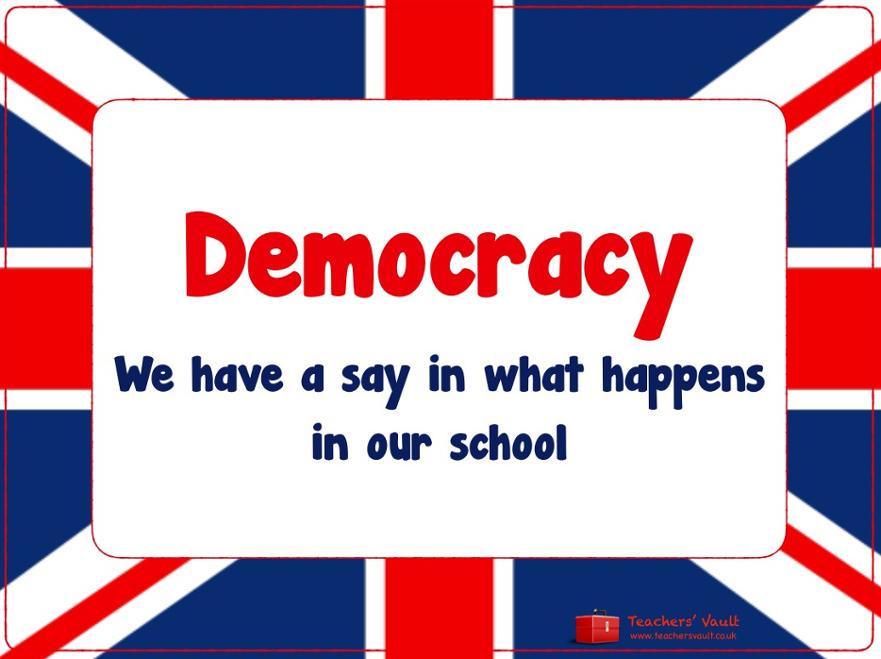
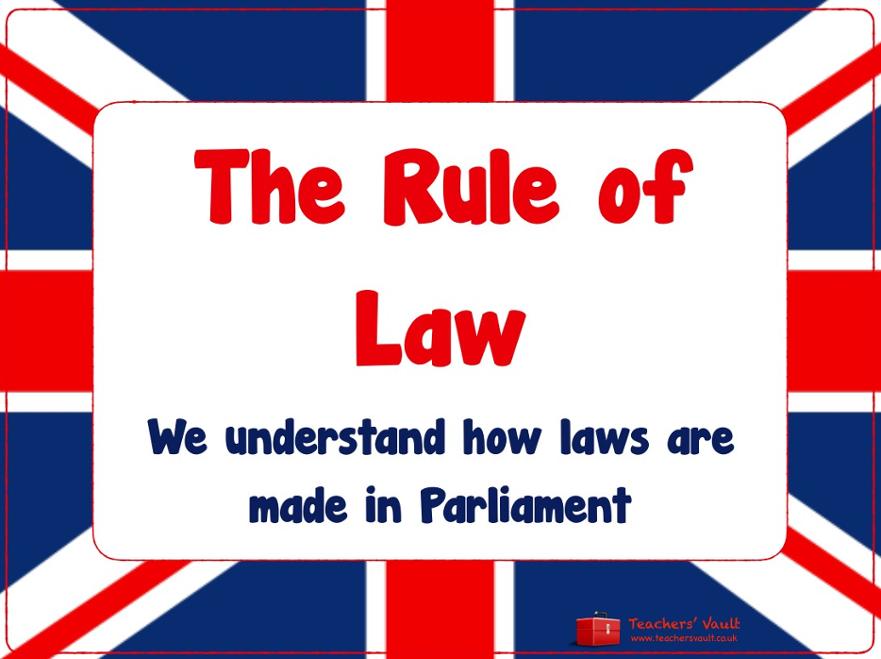
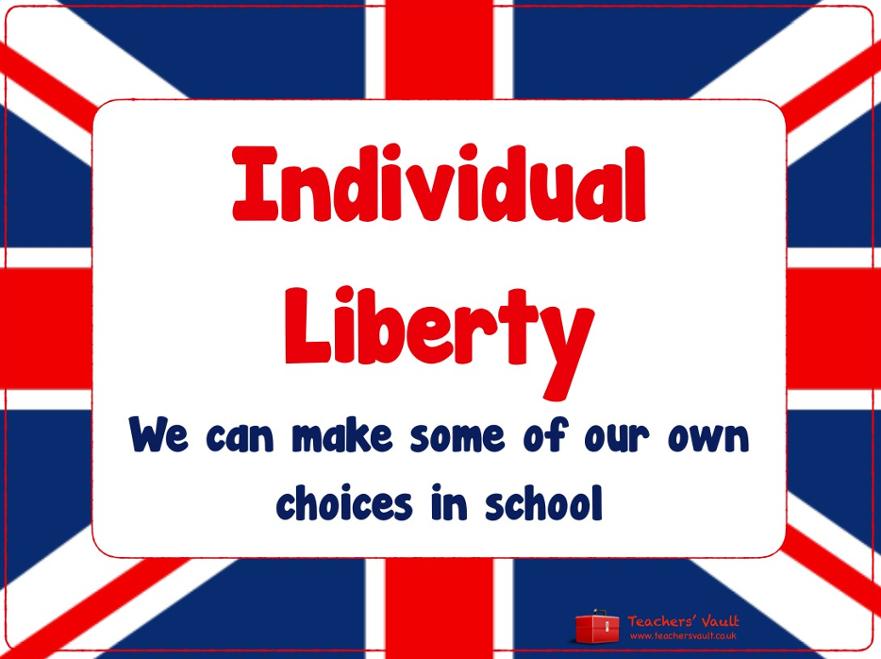
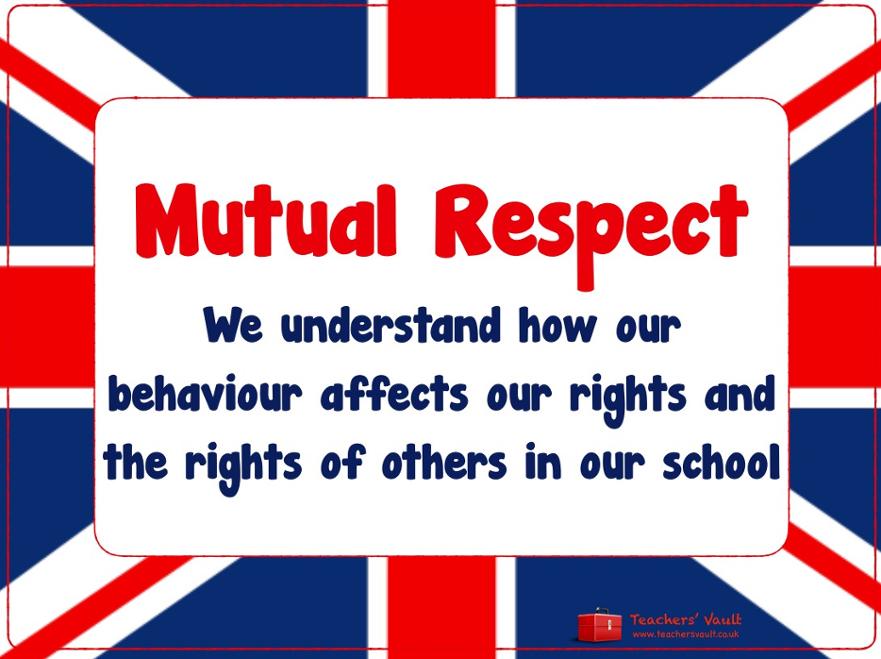
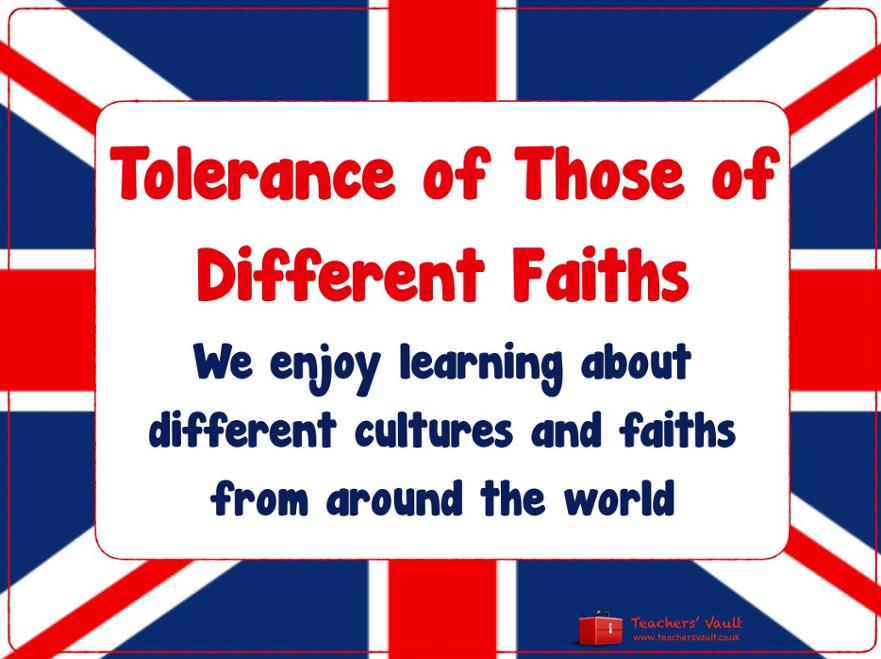
Online Bookshop for British Values
How are British Values taught through Geography?
Pupils learn about British Values through Geography lessons by exploring how places have been changed by the contexts and processes that have shaped them. It helps pupils to understand the complex ways in which communities and societies are linked and to appreciate the diversity of people’s backgrounds. Geography also helps pupils to understand society better e.g. Less economically developing Ark Kings Academy Curriculum Purpose & Rationale countries and more developed countries. Appreciating diversity encourages positive relationships and shared values. It promotes tolerance and partnership, within local and wider communities.
What links to careers can be made within the Geography curriculum?
Cartographer, Commercial/residential surveyor, Ecologist, Farm/estate manager, Nature conservation officer, Oceanographer, Planning and development surveyor, Recycling officer, Town planner, Air traffic controller, Foreign/travel writer, Freight forwarder, Logistics and distribution manager, Navigator (naval), Pilot, Tourism officer, Transport planner, Travel consultant
How are British Values taught through Science?
Individual liberty of own views, tolerance and mutual respect of others' views is taught through the topics where different views / ethics are involved, for example work in Upper Key Stage 2 on the theory of evolution. Pupils develop an awareness of health & safety for themselves and others when working practically. Pupils are taught the social skills around behaviour self-regulation to ensure collective responsibility for a safe and efficient working environment. They are taught to challenge each other’s behaviour or practices if they fall short of the collective expectations of the group.
What links to careers can be made within the Science curriculum?
Ecologist, Botanist, Nature conservation officer, Soil scientist, Zoologist, Veterinary surgeon, Animal technician, Biochemist, Forensic scientist, Laboratory technician, Meteorologist, Pharmacologist, Physicist, Dental nurse, Dentist, Dietician, Doctor, Midwife, Nurse, Optometrist, Paramedic, Pharmacist, Physiotherapist, Speech therapist
How are British Values taught through History?
British values, including those of democracy, the rule of law, individual liberty and mutual respect and tolerance of those with different faiths and beliefs are embedded in the History curriculum. Students explore issues such as democracy in their historical context and relate them to the modern day. By looking at the achievements of famous British people, pupils develop an awareness of how they have influenced and shaped the country in which we live. This includes an appreciation of the impact of their work in periods such as the Industrial Revolution as well as the contribution made in both World Wars. Teaching pupils to respect and value diversity is developed in the study of the civil rights movement and apartheid in upper Key Stage 2. Furthermore, by making links with modern day issues such as terrorism, pupils are made aware of the importance of British values over time. These values are also encouraged in the day to day teaching and learning through showing respect for different viewpoints and ideas as well as in the ability to work effectively together both individually and in groups.
What links to careers can be made within the History curriculum?
Archivist, Archaeologist, Art historian, Conservation officer, Genealogist, Heritage manager, Historic buildings inspector, History teacher, Museum curator, Museum education officer, Professional historian, University history lecturer
How are British Values taught through RE?
In our RE lessons, we aim to foster mutual respect through structured debate and discussion. Pupils are encouraged to question and explore sensitive and controversial issues, whilst maintaining tolerance and respect for the views and beliefs of others. Much of the RE curriculum is focused on understanding the beliefs and world-views of different people all over the world and through understanding, true tolerance develops.
What links to careers can be made within the RE curriculum?
Advice worker, Careers adviser, Care assistant, Community development worker, Police officer, Politician, Archivist, HE lecturer, Journalist, Librarian, Minister of religion/religious leader, Museum worker/curator, RE teacher, Television presenter/researcher
How are British Values taught through Physical Education?
A whole school approach to PE and School Sport can successfully promote fundamental British values and SMSC development provided that this is supported by the whole school community.
Democracy can be displayed through the establishment of a code of conduct for the school that permeates all subjects, including PE. Pupils are taught about the need for different roles and different responsibilities, including team work and decision making.
Pupils are taught the Rule of Law through a variety of PE activities that focus on age appropriate rules, fairness and respect. Pupils learn to work individually and in groups. In PE we establish an ethos with regard to how to win and lose fairly and understand good sporting behaviour. Competition against oneself is encouraged in addition to competition
Individual Liberty is promoted in PE through the recognition of individual differences. We have established an ethos where the views of individual pupils are listened to and respected within an acceptable framework. During lessons, pupils are taught safely and about safety.
Mutual Respect and Tolerance are key characteristics that are promoted through our PE curriculum. Our culture in PE respects cultural differences. Pupils are taught about the environment and different activity contexts. There are appropriate rewards and sanctions in PE for inappropriate behaviour. The school engages in competition and encourages competition within and across the community.
What links to careers can be made within the Physical Education curriculum?
Adventure/outdoor educator, Athletic director, Coach, College professor, Fitness instructor, Health/wellness teacher.
How are British Values taught through Art?
The Art curriculum delivers British values through having a sense of enjoyment and fascination in learning about the world around them and participating pupils actively in artistic and creative activities. We promote tolerance through different people’s ideas, creative responses and understanding of different cultures and styles within art. Pupils are encouraged to question and explore sensitive and controversial issues, whilst maintaining tolerance and respect for the views and beliefs of others. Pupils discuss and work in the style of a wide variety of artists and designers. British art is studied through the curriculum. Pupils have the opportunity to work independently and as a team to build resilience and self-esteem through tasks, sharing ideas and resources, peer-assessment and encouraging students to support each other.
What links to careers can be made within the Art curriculum?
Animator, Artist Illustrator, Sculptor, Technical illustrator, Blacksmith, Florist, Glass designer, Jewellery designer/maker, Leather craft worker, Picture framer, Sign writer, Stonemason, Upholsterer, Visual merchandiser, Curator, Museum director, Art journalist, Auctioneer, Tattooist
How are British Values taught through Computing?
Within Computing and ICT, we promote tolerance through different people’s ideas that may be built on cultural diversity which promotes mutual respect. We link this to pupils' behaviour online and how mutual respect and tolerance is applicable to the online world as well as in society. Pupils have the opportunity to work independently and as a team to build resilience and self-esteem through tasks. In particular, the idea of working in teams is vital in coding and debugging tasks. When working in groups pupils are expected to share ideas and resources and encourage and support each other. By promoting high expectations through the setting of ground rules, pupils are rewarded for positive behaviour.
What links to careers can be made within the Computing curriculum?
E-learning developer, Forensic computer analyst, Hardware designer, ICT consultant Systems analyst, Software developer, Computer service and repair technician, Helpdesk professional, IT project manager, Network engineer, Systems architect, Animator, Computer games designer, Web designer, Web developer
How are British Values taught through Design and Technology?
Pupils are taught about the moral choices facing designers & manufacturers when deciding on materials. Pupils consider sustainability to understand and apply ways of conserving the earth’s resources. There is a focus on recycling in food and how to manage portion sizes to minimise waste helps students to connect with the dilemmas of those who do not have an abundance of food. Pupils develop an awareness of health & safety for themselves and others when working practically. Pupils are taught the social skills around behaviour self-regulation to ensure collective responsibility for a safe and efficient working environment. They are taught to challenge each other’s behaviour or practices if they fall short of the collective expectations of the group. Pupils explore how products contribute to lifestyle and consumer choices and understand how products evolve according to users’ and designers’ needs, beliefs, ethics and values. In food education, pupils look at cultural influences on the food we cook and the diversity of ingredients available for us to cook with. They also learn about staple foods of other countries
What links to careers can be made within the Design and Technology curriculum?
Costume designer, Fashion design assistant, Fashion designer, Footwear designer, Hat designer/milliner, Textile designer, Food process worker, Meat process worker, Product/process development scientist, Production manager, Quality manager, Animator, Computer games designer, Web designer, Architect, Product designer, Engineer
How are British Values taught through Music?
The curriculum promotes tolerance and understanding of other cultures by incorporating music from many parts of the world (North America, South America, Africa and India as well as from other cultures closer to home in Europe and the United Kingdom). Freedom of expression is a regular feature in listening work as we distinguish between opinion and fact when discussing different music and encourage pupils to support their differing opinions with factual references. The discussions surrounding music from different cultures allow teachers to challenge the use of stereotypical cultural references and discuss how it can lead to discriminatory and prejudicial behaviour with the pupils
What links to careers can be made within the Music curriculum?
Music director, Producer/engineer (music), Production manager, Recording industry producer, Sound engineer, Sound technician, Studio manager, Band member, Classical musician, Community musician, Composer, Conductor, Lyricist, Performer, Soloist, Song writer
How are British Values taught through MFL?
The MFL curriculum actively promotes British Values (the key values of mutual respect, diversity and plurality) as there is a strong emphasis on promoting cultural values and traditions of other countries and global citizenship. By gaining an appreciation of the countries where the language the students are studying is spoken, they are encouraged to reflect on other cultures and ways of life and embrace socio-cultural and economic differences and contexts. This ensures that they remain open to the world around them and have a better grasp of the links and connections between countries and societies. This in turn, emphasises the need for tolerance and justice, and through their studies, our pupils come to value the rule of law and democratic systems that European countries and countries further afield enjoy despite the varied customs, festivals and national characteristics that makes every society so unique.
What links to careers can be made within the MFL curriculum?
Diplomat, Immigration officer, International aid/development worker, Interpreter, Journalist, Language specialist (MI5), Marketing executive, Sales executive, Translator
